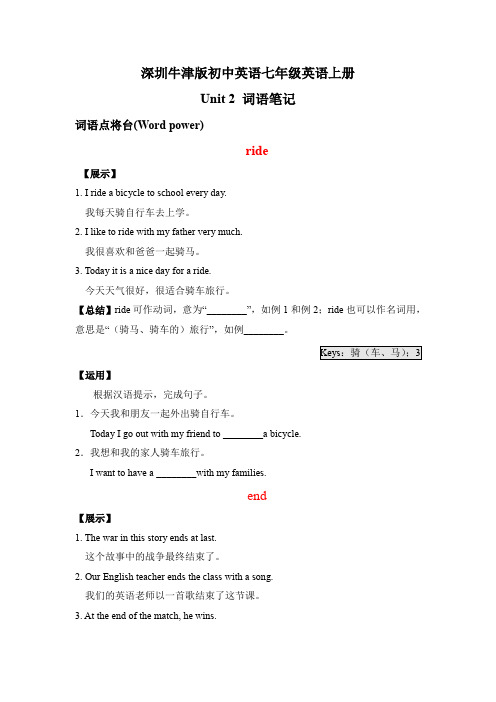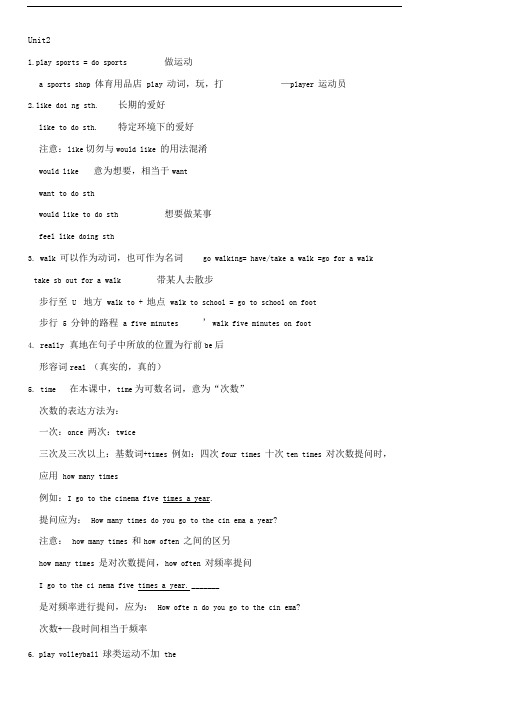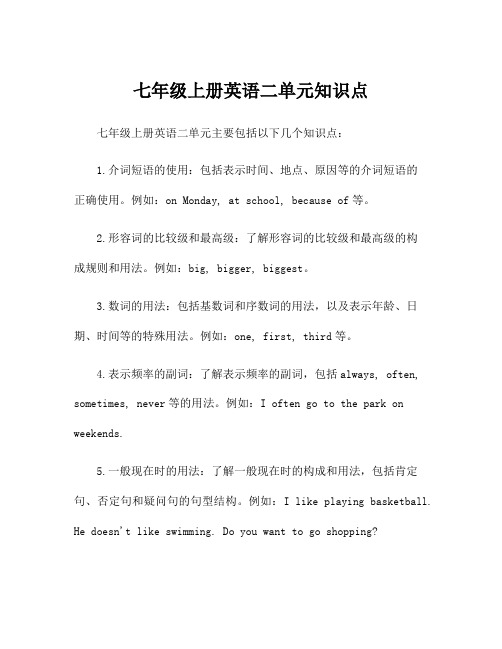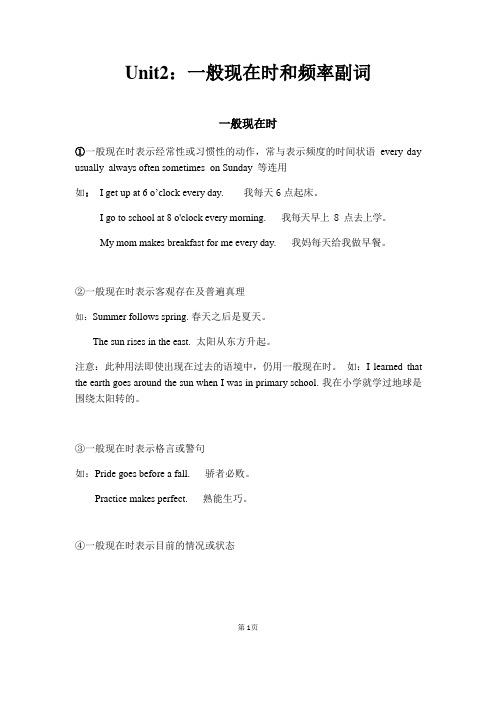【2015-2016】深圳牛津七年级英语上册第二单元知识点及语法学案
深圳牛津英语2015年秋季 7上 unit2 语法

竞争力1对1 英语学科教案学生年级上课地点后海校区授课时间学科老师学顾老师教学课题教学目标教学重、难点教学内容Step 1 作业检查作业完成情况:优□ 良□ 中□ 差□Step 2 复习回顾前一次教案知识点Step 3 本次教案内容一般现在时的构成1. be动词:主语+be(am,is,are)+其它。
如:I am a boy.我是一个男孩。
2.行为动词:主语+行为动词(+其它)。
如:We study English.我们学习英语。
当主语为第三人称单数(he, she,it)时,谓语动词要用第三人称单数,即要在动词后加"-s"或"-es"。
如:Mary likes Chinese.四、一般现在时的变化1. be动词的变化。
①否定句:主语+ be + not +其它。
如:He is not a worker.他不是工人。
②一般疑问句:Be +主语+其它。
如:-Are you a student? -Yes. I am. / No, I'mnot.③特殊疑问句:疑问词+一般疑问句。
如:Where is my bike?2.行为动词的变化。
①否定句:主语+ don't( doesn't ) +动词原形(+其它)。
如:I don't like bread.当主语为第三人称单数时,要用doesn't构成否定句。
如:He doesn't often play.②一般疑问句:Do( Does ) +主语+动词原形+其它。
如:- Do you often play football? - Yes, I do. / No, I don't.当主语为第三人称单数时,要用does构成一般疑问句。
如:- Does she go to work by bike? - Yes, she does. / No, she doesn't.③特殊疑问句:疑问词+一般疑问句。
深圳牛津版初中英语七年级英语上册Unit2词汇与语法

深圳牛津版初中英语七年级英语上册Unit 2 词语笔记词语点将台(Word power)ride【展示】1. I ride a bicycle to school every day.我每天骑自行车去上学。
2. I like to ride with my father very much.我很喜欢和爸爸一起骑马。
3. Today it is a nice day for a ride.今天天气很好,很适合骑车旅行。
【总结】ride可作动词,意为“________”,如例1和例2;ride也可以作名词用,意思是“(骑马、骑车的)旅行”,如例________。
Keys:骑(车、马);3 【运用】根据汉语提示,完成句子。
1.今天我和朋友一起外出骑自行车。
Today I go out with my friend to ________a bicycle.2.我想和我的家人骑车旅行。
I want to have a ________with my families.end【展示】1. The war in this story ends at last.这个故事中的战争最终结束了。
2. Our English teacher ends the class with a song.我们的英语老师以一首歌结束了这节课。
3. At the end of the match, he wins.比赛的最后,他赢了。
【总结】end作动词,意为“________”,如例1; end…with…意为“以………结束……”,如例2;end也可以作为名词用,意为“结束”,构成短语________ “在……的结尾”,如例3。
Keys:结束;at the end of 【运用】根据汉语提示,完成句子。
3.他的故事结束了。
His story ________.4.童话爱情故事的最后,王子和公主在一起了。
________the fairy-tale love story, the prince and the princess get together.practice【展示】1. We need more practice in playing the piano.我们需要多练习一下弹钢琴。
2015-2016深圳牛津七年级英语上册第二单元知识点及语法学案

2015-2016,深圳,牛津,七年级,英语,上册,第二,【,【2015-2016】深圳牛津七年级英语上册第二单元知识点及语法学案Unit Two Daily life Readingfamily 的意思是“家庭、家庭成员”,与居住的房子无关。
当family作为整体概念的“家庭”讲时是单数;当“家庭成员”讲时是复数; house 指“家”时含义较窄,仅指“房屋”这一建筑物,一般指独门独户的房子,不指楼房; home 指“家、住所”,指一个人(或一家人)居住的地方,也可指一个人出生或长大的地方(乡村、城市或国家等)。
它具有house所没有的感情色彩exercise是练习,一般用语,可指训练,锻炼,操练等.如spelling exercise(拼写练习), ,lack of exercise缺乏练习,do one's exercise做练习, physical exercise体育锻炼exercise的用法:1.作可数名词用,“练习,习题,体操,功课,操练”等,常用复数。
I'm doing my exercises.我在做练习/功课。
Doing morning exercises is helpful to our health.做早操对我们的健康是有益的。
You should do more spelling exercises. 你应该做更多的拼写练习。
2.作不可数名词用,“锻炼,运动”。
You are weak because of the lack of exercise.你身体弱是因为缺少锻炼。
Take more exercise,and you will be healthy.多多锻炼,你会健康的。
3.作动词用,“训练,锻炼”。
You must exercise yourself in order to be stronger and healthier.为了更健康更强壮,你必须锻炼自己。
七年级上册unit2的知识点总结

七年级上册unit2的知识点总结:七年级英语上册的第二单元是一个非常重要的单元,它是学习英语的基础。
本篇文章将会对该单元的知识点进行详细的总结,让你更好地掌握该单元的内容。
一、语法知识点1. 名词复数形式名词的复数形式是非常重要的语法知识点。
在这个单元中,我们需要学习如何将单数名词变为复数。
当单数名词以辅音字母+y结尾时,需要将y改为i加上es来表示复数;当单数名词以s、x、sh、ch结尾时,只需要在单数词尾加上-es就可以了,其他情况都可以在单数名词后面加上-s来表示复数。
2. 表示所属关系的‘of’在英语中,表示所属关系的词语是‘of’,即‘的’,我们需要掌握如何使用‘of’表示所属关系,比如说:“the sister of my mother”,翻成汉语就是“我的妈妈的姐姐”。
3. 一般现在时的三单形式一般现在时的三单形式指的是第三人称单数动词形式,即在动词后面加上‘s’或‘es’。
我们需要掌握不规则动词的变化规则,诸如第三人称动词的变化规则等。
4. 一般现在时的肯定句、否定句和疑问句了解一般现在时的肯定句、否定句和疑问句的构成是非常重要的。
在肯定句中,我们需要根据人称的不同给动词加上不同的词缀;在否定句和疑问句中,我们需要掌握正确的句子结构和使用语序。
二、词汇知识点1. 词根、词缀和单词的拼写规则了解词根、词缀和单词的拼写规则可以帮助我们更好地记住单词。
在本单元中,我们需要掌握很多句型和词组,比如“have to”,“clean up”,“wash the dishes”等。
2. 家庭成员的词汇在词汇方面,我们需要掌握各种家庭成员的称呼,例如:father, mother, brother, sister等。
3. 学校设施和职业的词汇在学习英语中,我们还需要掌握学校设施和职业的相关词汇,例如:teachers, classrooms, library, garden, bus driver, doctor等。
牛津译林版七年级英语上册Unit2重点知识点汇总

牛津译林版七年级英语上册Unit2重点知识点汇总【重点单词】1.really ['rɪəli] adv. (表兴趣或惊讶)的确,确实2.bowl [bəʊl] n.碗,盆3.time [taɪm] n.次,回4.tennis ['tenɪs] n.网球5.volleyball [ˈvɒlɪˌbɔːl] n.排球6.enjoy [ɪn'dʒɔɪ] v. 享受……的乐趣;欣赏;喜爱7.player ['pleɪə] n.运动员8.member ['membə] n.成员9.club [klʌb] n.俱乐部10.free [friː] adj.空闲的11.hope [həʊp] vt.希望12.dream [driːm] n.梦想;梦13.true [truː] adj.真的,真实的14.drawing [ˈdrɔːɪŋ] n.画画15.weekend ['wiːk'end] n.周末16.shop [ʃɒp] v.购物17.else [els] adv.另外;其他18.lot [lɒt] n.许多,好些19.fun [fʌn] n.享乐,乐趣;有趣的事20.team [tiːm] n.队;组【重点短语】1.play sports 做运动2. like walking 喜欢散步3. enjoy oneself 玩得开心4. be free 有空5. hope to do sth. 希望做某事6. come true (梦想)实现,成为现实7. at/on weekends 在周末8. of course 当然9. many of my students 我的许多学生10. something else 别的东西11. a lot of 许多12. talk about 谈论13. many times a day 一天很多次14. my favourite football player 我最喜爱的足球队员15. look strong 看起来强壮16. play football very well 足球踢得很好17. in one’s free time 在某人的空闲时间里18. enjoy listening to music 喜欢听音乐19. make sb. do sth. 使某人做某事20. watch ball games on TV 在电视上看球赛21.What/How about...? ……怎么样?【重点句型】1.Are you free?你有空吗?2.What’s your favourite sport?你最喜欢的运动是什么?3.He also enjoys listening to music.他也喜欢听音乐。
深圳牛津七年级第一、二单元课文及语法知识归纳

深圳牛津七年级第一、二单元课文及语法知识归纳牛津英语七年级上期各单元知识点归纳Chapter One Making friends Reading1. What do you know about……关于……,你知道多少?2. Friends often write to each other about their hobbies. Can you match the hobbies in the box with the picture below?write to sb. about sth. 就某事写信给某人in the box 在方框里match……with 把……和……匹配each other= one another彼此,互相3. Write down your hobbies. 写下你的爱好。
write down写下write to sb. 写信给某人4. Anna’s blog. sb?s 某人的Her parents’ na mes. 以s结尾时,只加’即可。
5. tell sb sth. 告诉某人某事tell a lie/ story 说谎/ 讲故事speak to sb. 对某人说话speak English 说英语talk to/ with sb 与某人交谈(to :单向;with:双向)listening to music reading books playing basketball(playing the piano)6. Welcome to my blog. welcome to sp. 欢迎来到某地7. I’m from Germany. 我来自德国。
be from= come from 来自Germany 德国German adj. 德国的n.德语;德国人(two Germans)German cars are very good. She was born in Germany.The Germans speak English very well.8. I?m 11 years old. 我十一岁。
牛津七上Unit2知识点

Unit2l.play sports = do sports 做运动a sports shop 体育用品店play 动词,玩,打—player 运动员2.like doi ng sth. 长期的爱好like to do sth. 特定环境下的爱好注意:like切勿与would like 的用法混淆would like 意为想要,相当于wantwant to do sthwould like to do sth 想要做某事feel like doing sth3.walk 可以作为动词,也可作为名词go walking= have/take a walk =go for a walk take sb out for a walk 带某人去散步步行至U 地方walk to + 地点walk to school = go to school on foot步行 5 分钟的路程 a five minutes ' walk five minutes on foot4.really 真地在句子中所放的位置为行前be后形容词real (真实的,真的)5.time 在本课中,time为可数名词,意为“次数”次数的表达方法为:一次:once 两次:twice三次及三次以上:基数词+times 例如:四次four times 十次ten times 对次数提问时,应用how many times例如:I go to the cinema five times a year.提问应为:How many times do you go to the cin ema a year?注意:how many times 和how often 之间的区另how many times 是对次数提问,how often 对频率提问I go to the ci nema five times a year. _______是对频率进行提问,应为:How ofte n do you go to the cin ema?次数+—段时间相当于频率6.play volleyball 球类运动不加thePlay the piano 乐器之前加the7.enjoyenjoy sth.enjoy doing sth 喜欢做某事例女口: I enjoy readi ng.enjoy on eself =have a good time= have fun (in )doing sth = It's fun to do sth例如:He enjoys himself playing basketball.=He has a good time play ing basketball.=He has fun play ing basketball.8.favourite = like sth best 最喜欢Wha' s your favourite sport? (前面用物主代词或名词所有格)=Which/What sport do you like best?9.What about= how aboutwhat about/ how about doing sth./ sth.(1)询问情况I am a stude nt. what about/ How about you? 我是一个学生,你呢?(2)用来表达征求意见和提出建议what about/ How about going fishi ng tomorrow?Why not do sth ?/ Shall we do sth ?/ Let ' s do sth ?10.be a member of= be in …club/team= play for club/teamHe is a member of our school football team.=He is in our school football team.look/ feel/ sou nd/taste/smell 为感官动词,后面需要加形容词The sofa feels soft.11.对某人的外貌提问的方法:How does he look?What does he look like?12.free 自由的:be free to do sth 反义词:busy be busy with / doing sth免费的:Shopping bags are not free now.13.English Club /sports club / dancing club take part in a club =join in a club14.make sb (宾)使某人.......(1)make +宾语+宾补make me stro ng(2)make sb do sth 使某人做... 事Swimmi ng makes her look stro ng.(3)make sb. Sth.=make sth. for sb.15.hopehope的用法非常重要,常考易错hope to do sthI hope to go on a pic nic with you.hope+句子注意:没有hope sb. to do sth. 这种用法,切记切记!!I hope I can help you with your En glish.如果在考试的时候看到hope后面紧跟的是sb,那么一定是hope后加的句子16.real和true的区别:real指事物本身的真假,ture指故事、消息、信息本身的真实性,不是虚构的e true 变成现实come from 来自come back 回来18.at weekends = on weekends =at the weekend =on the weekend\19.Many of my students...many of + the/one ' s + 名词They all = All of them20.else常用于特殊疑问词或不定代词后What else = what other thi ng somethi ng else21.Reading is fun. 动名词作主语,谓语动词用单数22.talk about sth with sb 和某人谈论关于某物23.hero, potato,tomato 、mango 变复数+es24.There be的一般将来时There will be / There is going to be / There are going to be25. 名词所有格:Tom's and Jack ' s bedroom 分别拥有Tom and Jack ' s bedroom 共同拥有26. shop = do some shopping fish = do some fishing read = do some reading。
牛津深圳版七年级上册unit2语法知识复习

— Ok, sweet, have a good time.
Production
根据汉语提示完成句子。
1. 这是一篇关于我们学校生活的文章。
This is _a_n_a_r_ti_c_le_ _ab_o_u_t_ our school life.
选词填空:
1) My father __jo_i_n_e_d_ the army in 1970.
2) He told me that he had an important meeting to _a_t_te_n_d___. 3) Last week some of my classmates_t_o_o_k_p_a_r_t _in_ the school
always 频度副词“总是,一直” ,通 常与一般 现在时连用。常用的频度副词有:
3. I enjoy learning about different places in the world.
句意:我喜欢了解世界上各个不同的地方。 enjoy 动词“享受,喜欢”,后跟动名词或名词。
enjoy oneself enjoy doing sth.
2. 数学老师很和蔼,他很少生气。
The Maths teacher is very kind and he _se_l_d_o_m_ gets angry.
3. 约翰喜欢参加学校组织的活动。
John enjoys t_a_k_in_g_ __p_a_rt_ ___in_ the school activities.
4.She always arrives at school at 7:25 a.m.
牛津深圳版七年级上册unit2语法知识复习

一般现在时 1.基本用法
3.按时间表(timetable)将要发生的动作 (课表、航班表、车程表等)
3.The train starts at 2 o’clock.(火车两点开) go, come, leave, start, move 表将来
— Mom, I want to go camping with my classmates.
— Ok, sweet, havห้องสมุดไป่ตู้ a good time.
Production
根据汉语提示完成句子。
1. 这是一篇关于我们学校生活的文章。
This is _a_n_a_r_ti_c_le_ _ab_o_u_t_ our school life.
2. 数学老师很和蔼,他很少生气。
The Maths teacher is very kind and he _se_l_d_o_m_ gets angry.
3. 约翰喜欢参加学校组织的活动。
John enjoys t_a_k_in_g_ __p_a_rt_ ___in_ the school activities.
4. He_w__a_s_h_e_s(wash) clothes with his hands. 5. Simon _p_a_s_s_e_s(pass) the ball to Daniel.
6. Miss Li_t_e_a_c_h_e_s(teach) Chinese. 7. Look at the animal, it _h_a_s_ four legs.
sports meeting and won prizes.
Unit2重点词汇和课文讲义牛津深圳版英语七年级上册(1)

U2重点词汇和课文【知识要点】【知识点一】单词一、重Array点词汇梳理1.daily 日常的【考点】同义词=everyday2.never 从不3.ride 骑;驾驶【考点】过去式:rode4.seldom 不常;很少【考点】同义词= not often5.break 休息;打破【考点】1. V 表示打破,过去式broke2. n 表示休息,have a break = have a rest6. ring 发出声音【考点】1. 同义词= make a sound2. 过去式rang7. end 结束【考点】同义词= stop8. practice 练习【考点】1. practice 后接动词,需用doing形式9. together 在一起【考点】同义词= with each other10. walk to sw 步行去某地= go to sw on foot.11. take part in 参加【考点】同义短语= join in12. have a good time 玩得开心【考点】同义词组= enjoy oneself / have fun13. enjoy 享受【考点】1. enjoy后接动词,需用doing 形式2. enjoy后接代词,需用反身代词enjoy oneself = have a good time 练习:单词填空1)My elder sister is in Class Two,G________Six2)It is very important in our d________life.3)I have a nice bike and I often r________it to school.4)Beyond is a famous b________.It has made great music.5)I think I need a lot of p__________to win the game.6)The film starts at eight thirty and e______at ten thirty.7)Li Ming is writing an a____________about daily life.8)Tom is a member in the school b___________.He plays the guitar very well.9)There is a big m_________near here. People can buy many things there.10)Before I finally learnt to r_______ a bike, I first fell down many time.◆◆ 词组1. junior high school 初级中学2. on foot 步行3. take part in=join in 参加4. have a good time=enjoy oneself 过得愉快5. go to bed/sleep 睡觉6. talk about 谈论7.brush teeth 刷牙8.watch TV 看电视9. ride a bicycle/bike 骑单车10. play the piano 弹钢琴11. wash clothes 洗衣服12. in the morning 在早上13.have break 休息14. from...to...从…到…15. at night=in the evening 在晚上16. at school 在学校17. get up 起床18. senior high school 高级中学19. have breakfast/lunch/supper/dinner 吃早/午/晚/正餐20. keep a dairy 写日记21. think of 考虑22. do morning exercises 做早操23. a piece of bread 一片面包24. a glass of... 一杯...... 25. at the end of... 在......末26. how long 多久,多长时间27. between...and... 在......和,,,,,,之间28. afterschool activities 课外活动29. how often 多久一次经典句型:1.H ow do /does... go to school?2.How long is...3.I alway have a good time...4.Is...close to...?5.Once a month ,I...6.How often do you...?7.They t hink ...as...详细讲解1.Listen to a boy talking about his weekend.【考点聚焦】Talk about意为“ ”,后面既可以接人,也可以接物。
七年级上册英语二单元知识点

七年级上册英语二单元知识点
七年级上册英语二单元主要包括以下几个知识点:
1.介词短语的使用:包括表示时间、地点、原因等的介词短语的
正确使用。
例如:on Monday, at school, because of等。
2.形容词的比较级和最高级:了解形容词的比较级和最高级的构
成规则和用法。
例如:big, bigger, biggest。
3.数词的用法:包括基数词和序数词的用法,以及表示年龄、日期、时间等的特殊用法。
例如:one, first, third等。
4.表示频率的副词:了解表示频率的副词,包括always, often, sometimes, never等的用法。
例如:I often go to the park on weekends.
5.一般现在时的用法:了解一般现在时的构成和用法,包括肯定句、否定句和疑问句的句型结构。
例如:I like playing basketball. He doesn't like swimming. Do you want to go shopping?
6.表示喜好和爱好的动词:了解表示喜好和爱好的动词,包括like, love, enjoy等的用法。
例如:I like playing soccer. She loves singing.
以上是七年级上册英语二单元的主要知识点,需要结合实际练习和学习教材中相关的例句和练习题来加深理解和掌握。
牛津英语七年级上册Unit2知识梳理

牛津英语7A Unit2知识梳理一、同步知识梳理知识点1:let型祈使句(P18)(1)Let's celebrate!这是由let引导的祈使句,祈使句是英语的基本句型之一,这个句式常用来表示说话人的建议、请求、命令等。
它的句型是“let+人称代词宾格+动词原形”,即“let+sb+do+sth”。
eg: Let's go and see our English teacher.Let me help you find it.注:let's和let us略有不同,“let's+动词原形”结构表示祈使对象包括说话人和听话人双方在内,而“let us+动词原形”结构表示请求对方允许自己(第一人称复数)做某事时,这里的us 不包含听话人在内,不能缩写。
(2)let型祈使句的否定形式分两种:①含第三人称主语的祈使句的否定形式在句首加don't。
②含第一人称主语的祈使句的否定式不再句首加don't,而是用“let +sb+not+do”eg: Don't let him in.Let's not laugh at her.知识点2:Eddie, do you like any sports? 艾迪,你喜欢运动吗?(P18)(1) like vt. 反义词是dis like 不喜欢(2) sport此处为可数名词,意为“体育运动”eg:Tennis is a popular sport. 网球是一项很流行的运动。
知识点3:Yes, I like walking. 是的,我喜欢散步。
(P18)walking 名词,“散步,行走”(动词+ing 变成名词,也叫动名词),动词形式为walk, 意为“走,步行”eg:Walking in the morning is good for people.知识点4:really adv. (副词) 实际上,事实上;My father didn't really love her. 我爸爸实际上并不爱她。
【2015-2016】深圳牛津七年级英语上册第二单元知识点及语法学案

【2015-2016】深圳牛津七年级英语上册第二单元知识点及语法学案Unit Two Daily life Reading1. Look at these pictures and answer the questions about your daily life.look at= have a look at 看一看; answer the questions= reply to the questions(reply to 更强调书面回答,较正式); daily life:日常生活2. Which of these things do you do once or twice a week?助动词do/does/did后面要跟动词原形;once a week, twice a week, three(four/ five…)times a week3. brush one’s teeth刷牙; watch television= watch TV看电视; play table tennis打乒乓球;ride a bicycly骑单车; play the piano弹钢琴; wash my clothes= do some washing洗衣服拓展:wash one’s face; comb one’s hair; pack one’s bag; do some cooking; go shopping= do some shopping; play computer games4. Look at the title of the article on page 17. Then circle the correct answer.the title of…: ……的标题;on page 17:在17页在具体体一天用on; 在具体几点钟用at; 在一段时间(如上/下午、星期、月份、季节、年),则用in on Monday; at 4 o’clock; in the morning; in summer;circle:圈出,划出;the correct answer:正确的答案5. How does Sam go to shool?特殊疑问句:特殊疑问词+ 一般疑问句6. a day at school 学校的一天; by Sam: 由Sam写的at school 在上学at the school在学校(可能是老师或家长)in hospital: 生病住院in the hospital: 在医院(可能是护士或家属)in bed: 卧病在床;躺在床上in the bed: 在床上(被窝里);on the bed: 在床上(如枕头)7. I am a junior high school student. I love going to school.junior high school 初中senior high school 高中primary school 小学love doing sth.= live doing sth. = enjoy doing sth.喜欢做某事practice doing sth.练习做某事finish doing sth. 做完某事go to school 去上学8. My school is close to my home, so I always go to school on foot.be close to 离……近= near =beside= not far away fromfamily 的意思是“家庭、家庭成员”,与居住的房子无关。
Unit2讲义牛津深圳版英语七年级上册

七年级英语上册unit 2二.经典句型:1.我的学校离我家很近,所以我总是步行去上学。
My school is ______ _______ my school, so I always go to school ______ _______.2.我喜欢了解世界上不同的地方I enjoy__________ _______different places in the world3.当铃响时,我和我最好的朋友Tom和Jack跑到操场.When the bell _______, I_____ to the playground with my best friends, Tom and Jack 4.午餐从上午11:50到下午12:30Lunch is ______ _____ 12:30 p.m.5.然后汤姆杰克和我参加了学校的乐队排练.Then Tom, Jack and I ______ _______ ______ the school band practice.6.晚上8点~9点之间,________ 8_______ 9 in the evening7.他总是在早上7:25到学校She always _______ ______school at 7:25 in the morning8.学校的午餐时间多长._______ ________is the school lunch time9.休息时间多短啊! _______ ________ it is!My name is Sam. Now I am a student(1)__________a junior high school.I love to go to school.(2)__________my home is close to my school, I always walk to school. My first lesson starts at 8 a.m. I am seldom late (3)_____school. In all subjects, I like Geography (4)________(well).I enjoy (5)_____________(learn)about as many places as possible in the world.In the morning, our lessons are usually Chinese, Maths and English. There (6)_______(be) a morning break at 9:50 a.m. As soon as the bell rings, I run to the playground withmy(7)___________(classmate). We often play games. The morning break (8)_________(end)twenty minutes later. How short time it is!I have lunch from 11:50 am to 12:30 pm.(9)_____________(we) classes end at threethirty.After school,my friend, Tom and Jack, and I take part in the school band practice. We play music together. I enjoy (10)_______________(my) at school.四.常考知识点:1. between一般指“两者”之间,常用短语:between…and.among一般指“三者或三者以上”之间练习1)The bank is __________the hospital and hotel.2)There is a map ________ two windows.3) The boy is playing ________his friends We have a good teacher. (改为感叹句) 分析:感叹句=感叹词+陈述部分! 步骤: 1.断。
七年级英语书上册牛津版知识点u2

七年级英语书上册牛津版知识点u2牛津版七年级英语书上册知识点U2U2是牛津版七年级英语书上册的第二个单元,本单元主要介绍了一些日常生活中常用的简单英语表达方式。
本文将介绍本单元的知识点。
一、日常交际口语在日常交际中,语言是我们进行沟通的工具。
本单元中介绍了一些基本的日常交际口语,让学生们能够熟练运用。
例如,我们在见到别人时可以用“Hello”、“Hi”、“Good morning/afternoon/evening”等问候语;在告别时可以用“Bye”、“See you later”、“Goodbye”等道别语。
此外,介绍了如何询问别人的情况,例如“How are you?”、“How’s it going?”等等。
同时,本单元也谈到了如何回答问候,比如可以回答“I’m fine, thank you. And you?”。
二、数字表达法我们生活中最常用的数字是阿拉伯数字,而在英语中读数字时有些不同。
本单元中介绍了如何正确读数字、介绍了一些关于数字的应用。
例如,在日常生活中我们购买商品时,需要询问价格。
当售货员用说英语介绍价格时,我们需要知道如何读其中的数字。
此外,我们还能够在日常生活中使用数字来介绍自己的年龄、身高等等。
三、描述人的外貌在日常生活中,我们会遇到各种各样的人,用简单的英语来描述别人的外貌会让我们的交流更加地顺畅。
例如,在介绍别人时,我们可以用如下语句:“She has long hair.”(她有长发),“He has brown eyes.”(他有棕色的眼睛)等等。
本单元还介绍了如何用英语来表达人物的年龄、服装、颜色和性格等方面的信息。
四、家庭成员家庭是人们在日常生活中最重要的社交单位之一。
在本单元中,我们可以学习到如何用英语表达家庭成员的称呼。
例如,“father”(父亲),“mother”(母亲),“grandfather”(爷爷),“grandmother”(奶奶),“sister”(姐妹),“brother”(兄弟),等等。
Unit2语法知识及词汇知识梳理复习牛津译林版英语七年级上册

一、写出下列动词的第三人称单数形式。
1 .work
2.read
3.fix
4. write
5.dress
6.wash
7.say
8.stop
9.enjoy
11 .watch
12.go
13.do
14.have
15. study
16.fly
17.finish
18.buy
19.dance
2O.cry
She has some vegetables fbr dinner at home every evening.(改为否定句)
Shevegetables for dinner at home every
evening.
2.My father and mother walk the dog on weekdays.(改为一般疑问句,并作否定回 答)
21.play
22.make _
二、用括号内动词的适当形式填空。
1.He often(have) dinner at home.
2.Daniel and Tommy(be) in Class One.
3.We(not watch) TV on Monday.
4.Nick(not go) to the zoo on Sunday.
5.they(like) the World Cup?
6.Whatthey often(do) on Saturdays?
7.your parents(read) newspapers every day?
8.The girl(teach) us English on Sundays.
9.She and I(take) a walk together every evening.
牛津深圳版英语七年级上册unit 2(1)教案

4. Train the students’ ability to cooperate. Let the students in different leves can take part in the activity.
5.Provie the chances to sudents to show themselves and practice the speaking ability.
20
第三环节 课堂练习
Step sih the exercise given on the sheet, like
2. Read after the tape and pay attention to the pronounciation of the new words.
3.Play the game:
Choose a number in a number table and answer the related questions like : Tell the Chinese meaning of the words , or Spell out the words ,or make a sentence with the words
4. Work in groups to learn the usage of the key words.
Daily , never, seldom , article , practise , end , etc.
5. let five students as a group and come to the blackboard to write down the words which are speak o ut by the other one student
英语初一上译林牛津版unit2知识点讲解和练习

英语初一上译林牛津版unit2知识点讲解和练习【单元学习重点和要求】【一】语音1、单词重读`cartoon `favourite `principal `badminton`practise `swimming `playground `modeltech`nology mu`seum ac`tivities infor`mation2、不完全爆破a(c)tivities frien(d)ship theGrea(t)Wall bi(g)trees the firs(t)prize3、句子重音和语调CanI`borrowyour↗pen?Doyou`haveyour↗books?MayI`watch↗TV?Isshe`talland↗slim?Areyou↗busy?Doyou`like↗music?【二】词汇1、单词assembly activities playground snack tuck prin cipal practiseswimmer favourite model badminton cartoon info rmationtechnology museum swimming organizing price trip slim2、词组it’stimefor+名词是做某事的时间了,该做某事了getup 起床after-schoolactivities 课外活动haveassembly 开晨会havelessons 上课eatbreakfast/lunch/supper 吃早/中/晚餐doone’shomework 做家庭作业watchTV 看电视gotobed 上床睡觉keepadiary 记日记adayatschool 在学校的一天lotsof 许多;大量havefun 娱乐,乐趣;快乐morethan 多于;超过twiceaweek 一星期两次swimmingclub 游泳俱乐部readcomicbooks 看连环漫画书have(no)timetodosth. 有〔没有〕时间做某事chatwithsb 和某人聊天/闲谈goswimming 去游泳Iwouldliketo+动词原形情愿干某事;想要干某事from...to…从……到……lookforwardto…期盼;盼望turnon 打开〔电灯、电视、收音机等〕Hereitis! 给你!【三】日常用语Isittimeforbreakfast? 是吃早饭的时候了吗?Whatareyougoingtodotoday? 今天你打算干什么?Pleasee-mailmesoon! 请尽快给我发电子邮件!WeareinClass1,Grade7. 我们在七年级一班。
英语七年级英语上册Unit-2-语法-一般现在时和频率副词讲义牛津深圳版

Unit2:一般现在时和频率副词一般现在时①一般现在时表示经常性或习惯性的动作,常与表示频度的时间状语every day usually always often sometimes on Sunday 等连用如:I get up at 6 o’clock every day. 我每天6 点起床。
I go to school at 8 o'clock every morning. 我每天早上 8 点去上学。
My mom makes breakfast for me every day. 我妈每天给我做早餐。
②一般现在时表示客观存在及普遍真理如:Summer follows spring. 春天之后是夏天。
The sun rises in the east. 太阳从东方升起。
注意:此种用法即使出现在过去的语境中,仍用一般现在时。
如:I learned that the earth goes around the sun when I was in primary school. 我在小学就学过地球是围绕太阳转的。
③一般现在时表示格言或警句如:Pride goes before a fall. 骄者必败。
Practice makes perfect. 熟能生巧。
④一般现在时表示目前的情况或状态第1页如:I am a teacher. 我是教师。
You are a student. 你是学生。
以here, there 等开始的倒装句,表示动作正在进行。
如:Here comes the bus. = The bus is coming. 车来了。
There goes the bell. = The bell is ringing. 铃响了。
一般现在时的构成①be 动词:主语+ be (am, is, are) + 其它。
如:I am a boy. 我是一个男孩。
You are a girl. 你是一个女孩。
- 1、下载文档前请自行甄别文档内容的完整性,平台不提供额外的编辑、内容补充、找答案等附加服务。
- 2、"仅部分预览"的文档,不可在线预览部分如存在完整性等问题,可反馈申请退款(可完整预览的文档不适用该条件!)。
- 3、如文档侵犯您的权益,请联系客服反馈,我们会尽快为您处理(人工客服工作时间:9:00-18:30)。
【2015-2016】深圳牛津七年级英语上册第二单元知识点及语法学案Unit Two Daily life Reading1. Look at these pictures and answer the questions about your daily life.look at= have a look at 看一看; answer the questions= reply to the questions(reply to 更强调书面回答,较正式); daily life:日常生活2. Which of these things do you do once or twice a week?助动词do/does/did后面要跟动词原形;once a week, twice a week, three(four/ five…)times a week3. brush one’s teeth刷牙; watch television= watch TV看电视; play table tennis打乒乓球;ride a bicycly骑单车; play the piano弹钢琴; wash my clothes= do some washing洗衣服拓展:wash one’s face; comb one’s hair; pack one’s bag; do some cooking;go shopping= do some shopping; play computer games4. Look at the title of the article on page 17. Then circle the correct answer.the title of…: ……的标题;on page 17:在17页在具体体一天用on; 在具体几点钟用at; 在一段时间(如上/下午、星期、月份、季节、年),则用in on Monday; at 4 o’clock; in the morning; in summer;circle:圈出,划出;the correct answer:正确的答案5. How does Sam go to shool?特殊疑问句:特殊疑问词+ 一般疑问句6. a day at school 学校的一天; by Sam: 由Sam写的at school 在上学at the school在学校(可能是老师或家长)in hospital: 生病住院in the hospital: 在医院(可能是护士或家属)in bed: 卧病在床;躺在床上in the bed: 在床上(被窝里);on the bed: 在床上(如枕头)7. I am a junior high school student. I love going to school.junior high school 初中senior high school 高中primary school 小学love doing sth.= live doing sth. = enjoy doing sth.喜欢做某事practice doing sth.练习做某事finish doing sth. 做完某事go to school 去上学8. My school is close to my home, so I always go to school on foot.be close to 离……近= near =beside= not far away fromfamily 的意思是“家庭、家庭成员”,与居住的房子无关。
当family作为整体概念的“家庭”讲时是单数;当“家庭成员”讲时是复数; house 指“家”时含义较窄,仅指“房屋”这一建筑物,一般指独门独户的房子,不指楼房; home 指“家、住所”,指一个人(或一家人)居住的地方,也可指一个人出生或长大的地方(乡村、城市或国家等)。
它具有house所没有的感情色彩always:总是.频率副词always/ usually/ often/ sometimes/ seldom/ hardly/ never 表示频率由多到少,是一般现在时的标志。
(位于be 动词之后,实义动词前)对频率提问用how often go to school on foot= walk to school步行去学校go to…on foot = walk to …9. Classes start at 8 am, and I am seldom late.start at: 几点开始be late: 迟到be late for school 上学迟到10. I enjoy learning about different places in the world.enjoy doing sth= like/love doing sth. very much 喜欢做某事learn about:获悉;了解different places in the world: 世界各地11. We have our morning break at 9:50.have one’s morning break: 上午休息时间have a break 课间休息have a rest 休息一会12. When the bell rings, I run to the playground with my best friends Tom and Jack.when:当……的时候此处连接两个先后发生的动作;也可表示两个动作同时发生,则:“过去进行时+ when+ 一般过去时”;另外, when也可对时间提问,“何时”run to…with sb. 和某人一起跑到……my best friends: 我最好的朋友们13. Break ends at 10:10. How Short it is!end at: ……时间结束how+ adj. (+主+谓) = what+ (a/an) + adj.+ n. (+主+谓) how 主要修饰形容词和副词,what修饰名词。
How short it is! = What short time it is!14. Lunch is from 11:50 to 12:30 p.m.from…to…从……到……from Monday to Friday15. Then Tom, Jack and I take part in the school band practice.take part in:参加,指参加会议或群众性活动等,着重说明句子主语参加该项活动并在活动中发挥作用;join指加入某个党派,团体组织等,成为其成员之一,意为:“参军、入团、入党”等; 和某人一道做某事,其结构为:join sb. in (doing) sth.,根据上下文,in (doing) sth. 也可以省去(join in多指参加小规模的活动如“球赛、游戏”等,常用于日常口语);attend是正式用语,指参加会议、婚礼、典礼;听报告、讲座等。
He'll attend an important meeting tomorrow.他明天要参加一个重要会议band: 乐队the school band practice: 学校乐队练习practice: 名词:练习Learning a language needs a lot of practice.动词practice doing sth. practice sthpractice the violin practice playing the pianopractise 实习.实践.指有规律的练习,特指反复练习,不断练习,如大音乐家需要不段的practiceexercise是练习,一般用语,可指训练,锻炼,操练等.如spelling exercise(拼写练习), ,lack of exercise缺乏练习,do one's exercise做练习, physical exercise体育锻炼exercise的用法:1.作可数名词用,“练习,习题,体操,功课,操练”等,常用复数。
I'm doing my exercises.我在做练习/功课。
Doing morning exercises is helpful to our health.做早操对我们的健康是有益的。
You should do more spelling exercises. 你应该做更多的拼写练习。
2.作不可数名词用,“锻炼,运动”。
You are weak because of the lack of exercise.你身体弱是因为缺少锻炼。
Take more exercise,and you will be healthy.多多锻炼,你会健康的。
3.作动词用,“训练,锻炼”。
You must exercise yourself in order to be stronger and healthier.为了更健康更强壮,你必须锻炼自己。
16. We make great music together. 我们一起演奏动听的音乐。
make是初中英语中出现频率很高的一个动词,它的用法主要有;make/ have/ let sb. do sth. 使某人做某事make sb. +adj.做某人……make friends交朋友make cakes做蛋糕make a noise发出噪音make yourself at home像在家里一样自然make sure确保go to …together 一起去together with 与……一样(常用作插入语)17. I always have a good time at school.have a good time = enjoy oneself= have fun 玩得开心at school 在学校拓展部分:18. Fill in the table below and then compare your school day with Sam’s.fill in 填写table: 表格below:以下(在……下,指位置低),反义词是above (在……上面);under: 在……下(正在方),反义词是over(在……正上方)compare…with 将……和……对比19. Jack is talking about his weekend. Listen to him carefully and fill in the blanks.talk about讨论listen to…carefully 仔细听fill in the blanks 填空20. Use the time expressions in the box to help you.the time expressions 时间短语use sth. to do sth. 用……去做……21. after lunch 午餐后类似:after school 放学后, after class 下课后between 8 and 9 in the evening:在晚上八点到九点之间between…and 在……之间(强调是两者之间)among 在……之间(三者或以上)later in the afternoon 下午晚些时候 a few minutes later=after a while 几分钟后,片刻之后22. go to school by bus 坐公交车上学study Chinese, Maths and English in the morning 早上学习英语、数学和英语take part in after-school activities 参加课外活动23. In pairs, take turns to ask and answer questions and complete your classmate’s daily schedulebelow. 两个两个,互相问答并完成以下你同学的日程表。
